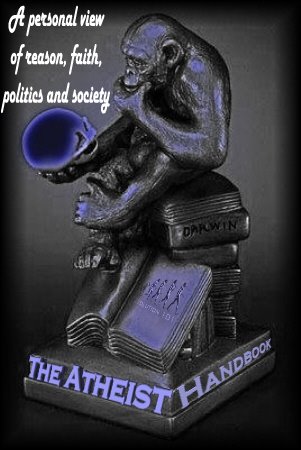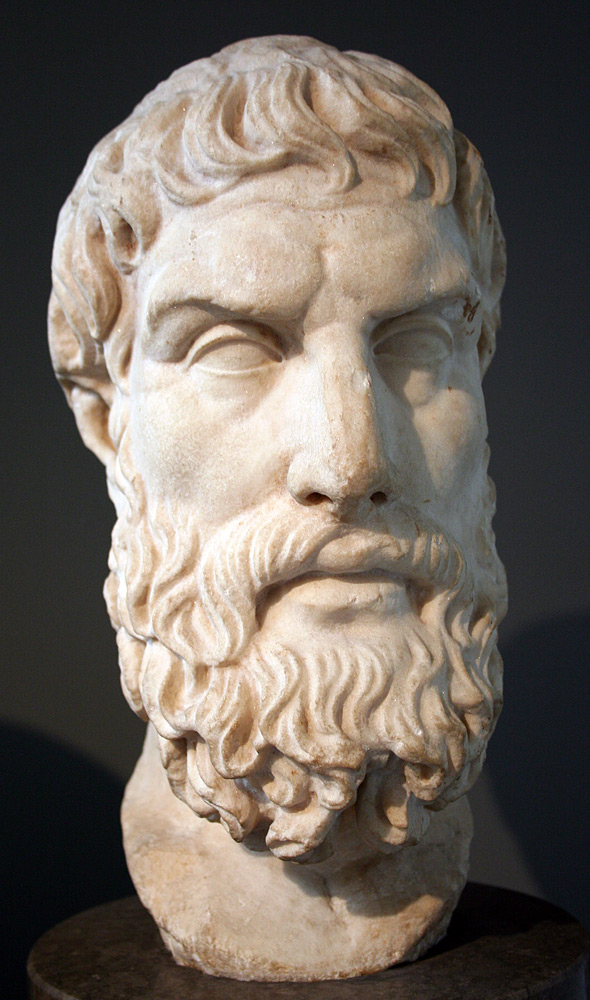 The unexamined life is not worth living for a human being.
The unexamined life is not worth living for a human being.-Socrates
It should come as no surprise to anyone that with the success of the atheist and anti-theist books of Richard Dawkins, Christopher Hitchens, Sam Harris and others, that believers would feel an obligation to strike back.
The faithful, particularly in our society in the west, often like to portray themselves as a prosecuted lot. This is particularly true of religious conservatives who imagine any statement that disagrees with their theology is a declaration of war. So we get the annual canard of the "war on Christmas" promoted by the likes of Bill O'Rielly on Fox News, or the recent call for a boycott of the upcoming film The Golden Compass by the Catholic League in New York on the grounds that atheism ought not be taught to children. These spastic attacks on non-belief betray, I think, a fundamental insecurity. They need, badly, everyone to conform to their belief systems. If an alternative view exists that opens the door to the possibility that they are wrong, and that seems to scare the hell out of them.
So a cottage industry has grown up in the shadow of the success of what is sometimes called "New Atheism." I've lost track of out many books have been published as responses to Dawkin's "The God Delusion" and Harris' "Letter to Christian Nation." Most of these books are fairly vapid and fail to answer the questions raised by Dawkins, Harris and others. Maybe that is why so many of them use the atheist author's names in their titles ( "The Dawkins Delusion" and "Letter from a Christian Citizen" for example) and even ape the layout of the book covers. Most of the time, these books simply fall back on tried old theist arguments from design and, more often than not, a variation of "the bible is true because the bible says it is."
More intellectually interesting responses do exist, fortunately. The ones I find the most interesting is presented by American Christian conservative Dinesh D'Souza, whose recent book "What's So Great About Christianity?" is the first attempt I am aware of to try and meet New Atheism on its own ground.
Unlike equally impressive theist thinkers like Alstair McGrath, D'Souza tries to use the same tools modern atheism uses - namely reason, logic, and scientific thinking. McGrath, for this all his brilliance, tends to fall back arguments that say "What I want say is there is SOMETHING about Christianity that we MUST pay attention too." Well, no we don't and that isn't much of an argument.
D'Souza on the other hand often lays out his arguments, at least initially, without directly quoting scripture. He doesn't present a nebulous "something" we should pay attention to. He is presenting a definite something, a kind of concrete Christianity that he argues from. This may be why he is, to my knowledge, the only apologist to hold his own against the formidable Hitchens in debate:
Of course, it's much harder to pin down a McGrath type argument because there isn't much there to grab. D'Souza presents claims that can be more directly scrutinized. And it should be, because D'Souza is presenting arguments that need to be careful considered.
During this debate with Hitchens, held at Christian college, D'Souza lays out his case as to why Christianity is "great". And while he presents his case with vigor, his mining of history is selective and at times, demonstrably false. And so while his claims as being the strongest defender of the faith in the wake of the atheism that Hitchens has played a role in reviving and promoting is not completely without merit, D'Souza certainly does not "debunk" atheism or prove the case the Christianity is true.
I'm going to address a few of the claims D'Souza makes during the Hitchens debate to illustrate what I mean. Here I will address his claim that without god we cannot be moral, and without Christian morals in particular Western Society would never have developed.
In part two I'm going to meet his claim that the Christian world view, and it alone, made science possible.
And in part three, I will address his contention that democracy is essentially a Christian invention - that is without Christianity there would no democracy at all.
....God, morality and an ring of invisibility....
"Without god everything is permissible," often appears in D'Souza's blogs and he repeats it in interviews and debates, including his debate with Hitchens. He sources it, as most people do, to the famous Russian author Fyodor Dostoevsky, and specifically his book The Brothers Karamazov. Unfortunately for D'Souza, and others who constantly say "As Dostoevsky said...", the old Russian didn't actually write that.
Characters in the novel do express that exact sentiment while questioning whether or not god exists. But using that specific line as a direct quotation is incorrect. Moreover, Dostoevsky puts the words into the mouths of his characters and it isn't clear that Dostoevsky, a hard core rationalist, believed such a thing. Indeed the novel itself makes no authoritative claim about the existence or non-existence of god. Dostoevsky, who to a degree mocks believe in god in the story, leaves the question unresolved.
So for an apologetic like D'Souza to attempt to use the novel as some kind of simplistic and authoritative declaration that morality is impossible without god, and imply that was Dostoevsky's personal view, is strange indeed.
Nevertheless, the phrase, misquoted though it is, does sum up D'Souza's position nicely. Morality comes from god. And if god didn't exist - and by god he means the god he happens to worship - then there is nothing to keep human beings in line. Human nature, from this point of view, is fundamentally weak and people will behave immorally without the guiding hand of a supernatural being who can punish and reward.
This is not a particularly new argument. It's one of the oldest declarations by fiat made by theism generally and Christianity in particular. But D'Souza take the argument a step further and claims, as he does during the Hitchen's debate, that without Christianity the West wouldn't be able to behave morally. That is, Christianity brought morality to us. He makes this claim forcefully in several ways, particularly when discussing the foundations of modern democracy, human rights and so on. I'll discuss more of this specifically in part three (where we'll talk a little bit out historical context) but here the critical point is that D'Souza is saying that the West would not have morality but for the faith.
To put it all another way, without god, the argument goes, we humans decide our morality ourselves. Hence the phrase "anything is permissible." Without god if I say raping a child is good, then it's good. There is nothing to contain every nasty impulse a human being has. One imagines, through this lens, that the pre-Christian world was a barbaric place where no one cared about morality at all.
Well, can we test his claim out? If his claim is true, there should be nothing akin to doing good for it's own sake, or philosophy that discussed a godless origin to universal morality before the Christian era. Well, how could there be? The idea here is that Christianity brought a moral code that had never existed before.
So I present Exhibit A: Glaucon.
No I didn't just sneeze. Glaucon was the older brother of Greek philosopher Plato and it is through a discussion between the pair in Plato's famous Republic that we find a Christainless, and godless explanation for morality.
The books is primarily concerned with one question: "What is justice?" and Plato, through the character of Socrates, takes the long way around to presenting an answer.
In the course of a conversation Glaucon gives us a description that I rather suspect D'Souza would agree with if god is taken out of the question. Glaucon tells a story about the a magic ring, the Ring of Gyges that can turn it's wearer invisible. Thus armed, the possessor of the ring can do whatever they want. No one will be able to punish them. Glaucon is making the case that people are ONLY just when their fear punishment. (Rather like the Christians who say that people are only good because they know god is watching.) With the ring all things are premissible, and human beings being weak as they are, will behave unjustly whenever the chance to do arises.
So to take this analogy to our present discussion, using the Ring of Gyges is like living in D'Souza's world without a god. Everything is premissible.
Socrates though, takes a rather dim view of this. He argued that what is just is an innate quality of human nature. To act unjustly is, ultimately, to act against oneself. When reason rules over our impulses, he said, we keep ourselves in check. As a result, one does good things because they are good. You act justly for its own sake. So the truly just man doesn't need the promise of a reward or the threat of punishment. The just man would not use the Ring of Gyges for ill gain, Socrates said, BECAUSE it is unjust.
I recommend you read the Republic in its entirety because what Plato was saying is critically important. If morality only exists because someone enforces it, then it isn't really moral at all.
So here is a pre-Christian line of thought that suggests a very ethical and moral philosophy, doing good for its own sake, that does not require a god at all. Indeed the imposition of a divine morality would, by this view, cease to make it moral. The very existence of Plato's Republic dashes the notion that morality, by definition, is Christian.
Of course, we all know that morality is not absolute. It evolves. Nearly all societies in the past thought slavery, torture and various other abuses were prefectly fine at some level or another. This includes Christianity, by the by. But as society matures and grows things change. What Richard Dawkins calls "the moral zeitgiest" changes.
D'Souza is correct when he points, for instance, that the Quakers used their belief that all men are equal creations of god as a justification to attack the institution of slavery. But what he leaves out is that the Quakers were a sectarian anomaly. Most believers of the day had no problem at all with slavery because the Bible itself contains no injunction against it. Graven images have a specific commandment banning them, but no such rule for slavery. Not surprising given the book was assembled during a period when slavery was as common place as breathing. It takes Enlightenment era Quakers to reinterpret the Bible, ignoring bits like St. Paul telling slaves to obey their Christian masters, to come a moral conclusion that slavery is wrong. Can we really discount the era these Quakers lived in, an era where the ideas secular humanism and the rule law are reborn in their modern sense? To view them in a kind of religious vacuum is, I submit, foolish.
What's my point after all of this? While I agree with him on most things, I will not go as far as Hitchens to say religion "poisons everything." There are enough examples of religiously motivated people doing good to say "everything" goes a bit too far. But that said, when one considers the great moral acts of people like the Quakers necessitated a drastic reinterpretation of the texts, D'Souza's notion that morality comes from Christianity is rather suspect. Rather believers will pick and choose their morality just like everyone else.
I think Plato was right. While it is very difficult to know the exact origins of our sense of morality (although we know much about it from an evolutionary point of view) there is something of an innate sense of morality in all of us. But it is a vague thing, easily changed by cultural influences. So it is not that Christianity created morality, but that it was used by some in a highly selective manner as justification for their morality. So wherever our moral sense comes from, it doesn't come from religion - particularly a religion which claims to be the sole source of an immutable morality.
The question of right and wrong, of how to treat ourselves and others, has been around in Western culture long before anyone heard about a carpenter's kid preaching in the Holy Land. It is something we still struggle with today, and is far bigger than any declaration of faith.
















8 comments:
You should read Dinesh's entire book as in the later Chapters (15, 21, & 22 specifically) or Part V), he explains how the whole idea of morality (not only in the West but across the entire world, even including such 'savage' tribes as you might find in the jungles) is absolute. His argument that the West is 'reformed' due to Christianity is entirely historical though as during the Roman empire, the european peoples were quite savage themselves.
In response to this quote by Darwin:
"Ignorance more frequently begats confidence than does knowledge: it is those who know little, and not those who know much, who so positively assert that this or that problem will never be solved by science." -Charles Darwin
I suppose that might have been true before the work of Kurt Godel. But, Godel's incompleteness theorems proved without a shadow of a doubt that our human intelligence and reasoning mechanisms are limited in what they can find as 'true'. Materialists like to ignore old Godel, but his findings came as a death punch to the idea of systematized formal deductive proofs encapsulating all truth almost 100 years ago. Does anyone know about this decisive refutation of materialism nowadays? --or-- what about the ontological proof of God's existence that Godel refined?
He proved as JR Lucas puts it that 'reality outruns knowledge'. Does that not prove the existence of a metaphysical realm (or at the very least metaphysical truths)?
Also, this leaves aside the restrictions on human investigative powers that Kant illuminated over 2 centuries ago (which naturalists also like to conveniently ignore) for another post.
--Jonathan
With regards to the 'source' of morality--
I think Dinesh (and virtually all other Christians) do not claim that even Christ Himself (in his physical manifestation) is the source of 'morality'. Rather, only that He 'revived' or appealed to an already existing innate sense (as you put it).
Dinesh quite clearly says in his book that the sense of morality is innate as well (also termed a 'conscience') and that is exactly the piece of evidence he provides for universality of the concept (aside from the influence of religion).
As is too often the case, those on the opposite side of this debate tend to prefer to argue against straw men and not even make an attempt to actually read the books they argue against.
--Jonathan
Jonathan;
Thanks for reading.
Most of what I would say in response to you is, for the most part, already in my blog here.
Interesting, though that you raise Godel. I was recently debating this issue on Youtube. And you make a massive error in your argument. Godel's incompleteness theorem is not a proof of a god nor a refutation of materials. I rather suspect he'd giggle at your misuse of him.
The incompleteness theorem refers only to math, and only to math using natural numbers. What he showed was that there were axioms about natural number that are assumed to be true, but could not be shown to be so through maths. If we extent his argument, which he did not to, to the arena of theology, what Godel is saying is that one can assume a god exists, but cannot prove it to be so.
All I said was that Godel's incompleteness theorems proved the limitation of the human mind and logic and therefore materialism or naturalism. It was actually another of Godel's lesser known works involving extensions to and the refinement of the argument from ontology that claims to prove the existence of God.
See:
http://en.wikipedia.org/wiki/Gödel%27s_ontological_proof
I personally think the original ontological proof is rather weak (because it's based on an arbitrary and somewhat simplistic definition of God as 'that of which no greater can be thought'. But, Godel's refinements are quite convincing.
Obviously, Godel himself was a religious man, so it seems quite odd to me that you think he'd giggle at my supposed misuse of him. It also seems entirely reasonable to think that at least some of the philosophical implications of his incompleteness theorems were known to him and influenced other areas/works of his life.
And, with regards to the 'misuse'-- the incompleteness theorems of Godel apply to all 'related systems', i.e., all formal deductive systems of sufficient complexity to encode the arithmetic of natural numbers (including the one inside the human mind). JR Lucas has done a lengthy essay which would do no one any good to repeat imperfectly here (so I'll just point you to it):
See:
http://users.ox.ac.uk/~jrlucas/mmg.html
In essence, 'reality outruns knowledge'. Which is another way of saying the same basic thing Kant said in 'Critique of Pure Reason' (for different although completely consistent and complementary reasons). I do think that the incompleteness theorems prove the existence of a metaphysical realm though not necessarily of God Himself.
Another of JR's essays (which might be even more applicable to this debate is this one):
http://users.ox.ac.uk/~jrlucas/Godel/implic.html
(That's the one I pulled 'reality outruns knowledge' from).
Post a Comment